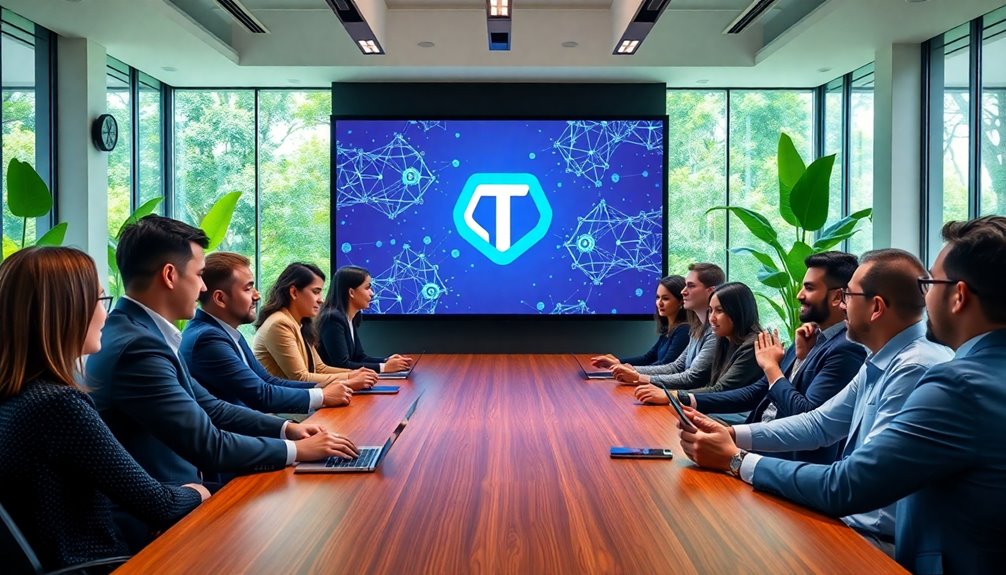You might not be familiar with QTUM, but this blockchain platform is quietly positioning itself as a significant player in the decentralized application space. By combining Bitcoin's UTXO model with Ethereum's smart contracts, QTUM offers a unique framework that enhances both security and efficiency. Its Mutualized Proof of Stake consensus mechanism sets it apart, but what does that really mean for the future of cryptocurrency? As regulatory landscapes shift and partnerships grow, you'll want to understand how QTUM could be a game changer.
Key Takeaways
- Qtum combines Bitcoin's UTXO model with Ethereum's smart contracts, enhancing transaction efficiency and functionality.
- Its unique Mutualized Proof of Stake (MPoS) mechanism improves security and transaction speed, reducing competition for computational power.
- Qtum actively navigates diverse regulations, ensuring compliance with KYC and AML requirements across various jurisdictions.
- Strategic partnerships with companies like Zeux and PwC help integrate blockchain technology into real-world applications like payments and supply chain management.
- The platform addresses cryptocurrency price volatility through limited supply and market liquidity, influencing investor behavior and market dynamics.
Qtum's Unique Consensus Mechanism

When you explore Qtum's unique consensus mechanism, you'll discover that it employs a Mutualized Proof of Stake (MPoS) system designed to boost both efficiency and security. This mechanism reduces competition for computational power, making it easier for participants to join and speeding up transaction times. By enhancing smart contract functionality, it also lowers the risk of "junk contracts" and potential attacks. Validators stake QTUM tokens to confirm transactions and share block rewards, which discourages malicious activities due to delayed payments. Overall, MPoS promotes high decentralization, energy efficiency, and scalability, allowing Qtum to handle transactions effectively without the resource demands of traditional mining practices. This unique consensus mechanism combines Bitcoin's UTXO model and Ethereum's smart contracts to further improve functionality. You'll find that this innovative approach sets Qtum apart in the blockchain landscape.
Regulatory Changes Impacting Qtum

As the regulatory landscape for cryptocurrencies evolves, Qtum faces significant challenges and opportunities that can shape its operations and growth. You'll need to navigate jurisdictional variations, ensuring compliance with diverse regulations across the globe. Understanding KYC and AML requirements is crucial; failing to implement robust identification procedures can lead to severe penalties. Additionally, determining if your tokens qualify as securities impacts registration and disclosure obligations, affecting investor trust. Data privacy concerns also loom large, especially with GDPR compliance in the EU. Furthermore, the unique hybrid blockchain architecture of Qtum positions it to adapt more effectively to changing regulations compared to other cryptocurrencies.
Cryptocurrency Price Volatility

Cryptocurrency price volatility is a defining characteristic of the market, often influenced by a whirlwind of factors including market sentiment, supply and demand dynamics, and regulatory changes.
You'll notice that prices react swiftly to news and social media updates—positive news can drive prices up, while negative news can cause steep drops. This emotional trading often leads to herd behavior, amplifying volatility.
The balance of supply and demand plays a crucial role, too; limited supply can boost prices as interest rises. Moreover, the supply concentration among few funds can lead to sharp price movements that further contribute to market unpredictability.
Additionally, market liquidity impacts how easily you can buy or sell cryptocurrencies. Large-scale investors, or whales, can sway prices with their trades, making the market even more unpredictable.
Understanding these dynamics is key to navigating the cryptocurrency landscape.
Corporate Partnerships and Collaborations

In the fast-paced world of cryptocurrency, strategic partnerships and collaborations play a significant role in shaping the future of blockchain technology.
QTUM has forged powerful alliances, such as with Zeux, allowing crypto payments through Apple Pay and Samsung Pay. Their partnership with PwC focuses on developing blockchain solutions for supply chain management. Furthermore, these collaborations also aim to enhance financial transparency across various sectors.
Additionally, collaborations with Baofeng and SpaceChain aim to build a blockchain-based entertainment platform and integrate blockchain into space, respectively.
In healthcare, QTUM works with Medicis Ventures to create blockchain solutions that enhance patient outcomes and secure data management.
Finally, their partnership with AWS expands enterprise blockchain offerings, enabling high transaction speeds and efficient smart contract development, ensuring QTUM remains at the forefront of innovation.
Government Regulations and Blockchain Adoption

While navigating the evolving landscape of blockchain technology, understanding government regulations becomes crucial for businesses seeking adoption.
Various federal agencies, like the SEC and CFTC, play significant roles in shaping the regulatory framework. Compliance can be tricky due to differing state laws and international regulations that create uncertainty. Additionally, the SEC governs digital asset offerings and applies securities laws to ICOs and token sales, which adds another layer of complexity for businesses in the blockchain space.
You're likely to encounter challenges such as jurisdictional overlaps and privacy concerns, which complicate the integration of blockchain into your operations.
Moreover, with increasing regulatory focus, staying informed about consumer and investor protections is essential.
Some regions are adopting regulatory sandboxes to encourage innovation, while others are taking a wait-and-see approach.
To thrive, you'll need to leverage emerging regtech services to navigate compliance effectively.
Long-term Scalability Prospects

As blockchain technology matures, its long-term scalability becomes a key factor for successful adoption. Qtum stands out with its unique ability to adjust blockchain parameters without hard forks, enabling dynamic scaling. It can handle around 1,100 transactions per second, significantly outpacing Bitcoin. The implementation of Segregated Witness further controls transaction costs while ensuring a high throughput via Segregated Witness. With its Proof of Stake mechanism, Qtum enhances energy efficiency and transaction speed, processing about 70 transactions every 32 seconds.
Its hybrid architecture supports seamless smart contract execution and decentralized application development. Looking ahead, ongoing research into quantum computing could optimize scalability, ensuring Qtum remains efficient and secure in a rapidly evolving landscape.
Frequently Asked Questions
What Is Qtum's Main Purpose in the Blockchain Ecosystem?
Qtum's main purpose in the blockchain ecosystem is to blend security and scalability for decentralized applications.
You get high transactional security through Bitcoin's UTXO model and can leverage Ethereum's smart contracts seamlessly.
Its Proof-of-Stake consensus reduces energy use, while a large node network enhances interoperability.
How Does Qtum Differ From Bitcoin and Ethereum?
Qtum differs from Bitcoin and Ethereum mainly in its consensus mechanism, using Proof of Stake (PoS) instead of Proof of Work (PoW), making it more energy-efficient.
It combines the Unspent Transaction Output (UTXO) model with an Account Abstraction Layer for enhanced smart contract functionality.
Additionally, Qtum features a decentralized governance protocol, supports interoperability with other chains, and boasts a growing dApp ecosystem, positioning it uniquely within the blockchain landscape.
Can Qtum Be Mined, or Is It Solely Proof-Of-Stake?
You'll find it interesting that Qtum has a total supply of 107,822,406 coins.
Unlike traditional cryptocurrencies, you can't mine Qtum; it operates solely on a Proof-of-Stake (PoS) consensus mechanism.
That means you acquire QTUM through staking, not mining. This approach is more energy-efficient and allows you to earn rewards while also participating in governance decisions.
What Wallets Support Qtum for Storage and Transactions?
If you're looking to store and transact with QTUM, you've got several wallet options.
The official Qtum Core, Mobile, and Desktop wallets offer secure management tailored for your needs.
For third-party solutions, consider Binance Wallet, Trust Wallet, or Ledger for enhanced security.
Hybrid options like BLOX and Qbao allow you to manage multiple cryptocurrencies.
If you're an advanced user, check out the Qtum Neutron or CLI Wallet for specialized features.
Are There Any Notable Projects Built on the Qtum Platform?
Yes, there are several notable projects built on the Qtum platform.
You'll find Qbao, a multi-chain wallet that simplifies managing cryptocurrencies.
InkChain focuses on intellectual property management and supply chain transparency.
The Qtum Virtual Machine (QVM) allows for flexible smart contract execution, while the Decentralized Governance Protocol (DGP) ensures community participation in decision-making.
Don't forget the Qtum Core Wallet, which offers a user-friendly interface for managing your QTUM tokens securely.
Conclusion
In a world where businesses seek efficiency and security, QTUM stands out as a game-changer. Imagine a supply chain company using QTUM's smart contracts to automate payments, ensuring every transaction is secure and instantaneous. With its unique consensus mechanism and adaptability, QTUM not only enhances transparency but also builds trust among partners. As industries embrace this technology, you'll see how QTUM can transform everyday operations, paving the way for a more decentralized future.









